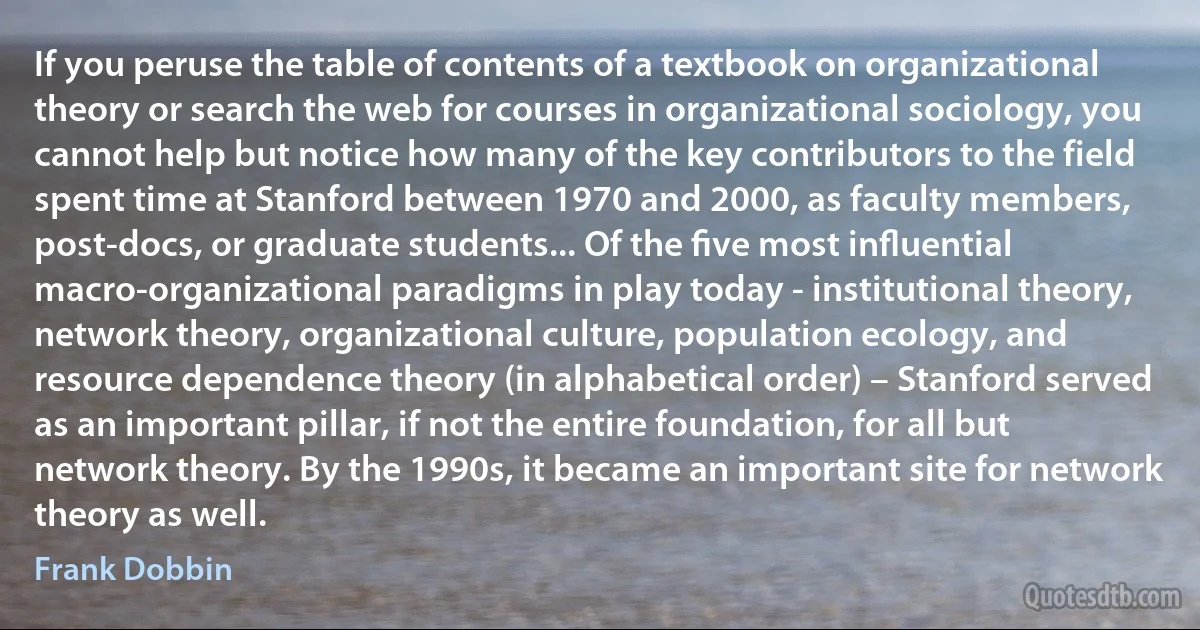
If you peruse the table of contents of a textbook on organizational theory or search the web for courses in organizational sociology, you cannot help but notice how many of the key contributors to the field spent time at Stanford between 1970 and 2000, as faculty members, post-docs, or graduate students... Of the five most influential macro-organizational paradigms in play today - institutional theory, network theory, organizational culture, population ecology, and resource dependence theory (in alphabetical order) – Stanford served as an important pillar, if not the entire foundation, for all but network theory. By the 1990s, it became an important site for network theory as well.
Frank DobbinRelated topics
entire faculty field five help key network notice order peruse play search site sociology spend table time web well influential 1990s today ecology textbookRelated quotes
Every man who labored for the rebellion in the field, who murdered Union prisoners by cruelty and starvation, who conspired to bring about civil war in the loyal states, who invented dangerous compounds to burn steamboats and northern cities,, who contrived hellish schemes to introduce into northern cities the wasting pestilence of yellow fever, calls himself a Democrat. Every dishonest contractor who has been convicted of defrauding the government, every dishonest paymaster or disbursing officer who has been convicted of squandering the public money at the gaming table or in gold gambling operations, every officer in the army who was dismissed fur cowardice or disloyalty, calls himself a Democrat.

Oliver P. Morton
The main theme of this report is a particular facet of the general problem of pre-organization in self-organizing systems, namely, the theory and circuitry of information processing networks. One may consider these networks as a special type of parallel computation channels which extract from the set of all possible inputs a particular subset which is defined by the internal structure of the network. The advantage of such operationally deterministic networks in connection with adaptive systems is the obvious reduction in channel capacity of the adaptors, if it is possible to predetermine classes of inputs which are supposed to be meaningful for those interacting with the automaton.

Heinz von Foerster
Nevertheless. among all the temptations I will have to resist today. There would be the temptation of memory: to recount what was for me. and for those of my generation who shared it during a whole lifetime. The experience of Marxism. The quasi-paternal figure of Marx, the way it fought in us with other filiations, the reading of texts and the interpretation of a world in which the Marxist inheritance was-and still remains, and so it will remain-absolutely and thoroughly determinate. One need not be a Marxist or a communist in order to accept this obvious fact. We all live in a world, some would say a culture, that still bears, at an incalculable depth, the mark of this inheritance, whether in a directly visible fashion or not.

Jacques Derrida
Just as soon as the great and glorious Revolution broke out [1918 - after World War 1. ] I gave notice and now live entirely for art. For a while, I tried to create new forms of art from the remains of the old culture. From this Merz painting emerged, painting that happily used every material – Pelikan [was a famous ink mark, then] colors or the rubbish from the rubbish heap. So I experienced the Revolution in the most delightful way and pass for a Dadaist, without being one. As a result, I could introduce Dadaism in Holland [together with Theo van Doesburg and his wife Nele] with complete impartiality. In Holland I became familiar with architecture for the first time.

Kurt Schwitters
[S]cientists are not robotic inducing machines that infer structures of explanation only from regularities observed in natural phenomena (assuming, as I doubt, that such a style of reasoning could ever achieve success in principle). Scientists are human beings, immersed in culture, and struggling with all the curious tools of inference that mind permits [...]. Culture can potentiate as well as constrain-as Darwin's translation of Adam Smith's laissez-faire economic models into biology as the theory of natural selection. In any case, objective minds do not exist outside culture, so we must make the best of our ineluctable embedding.

Stephen Jay Gould
